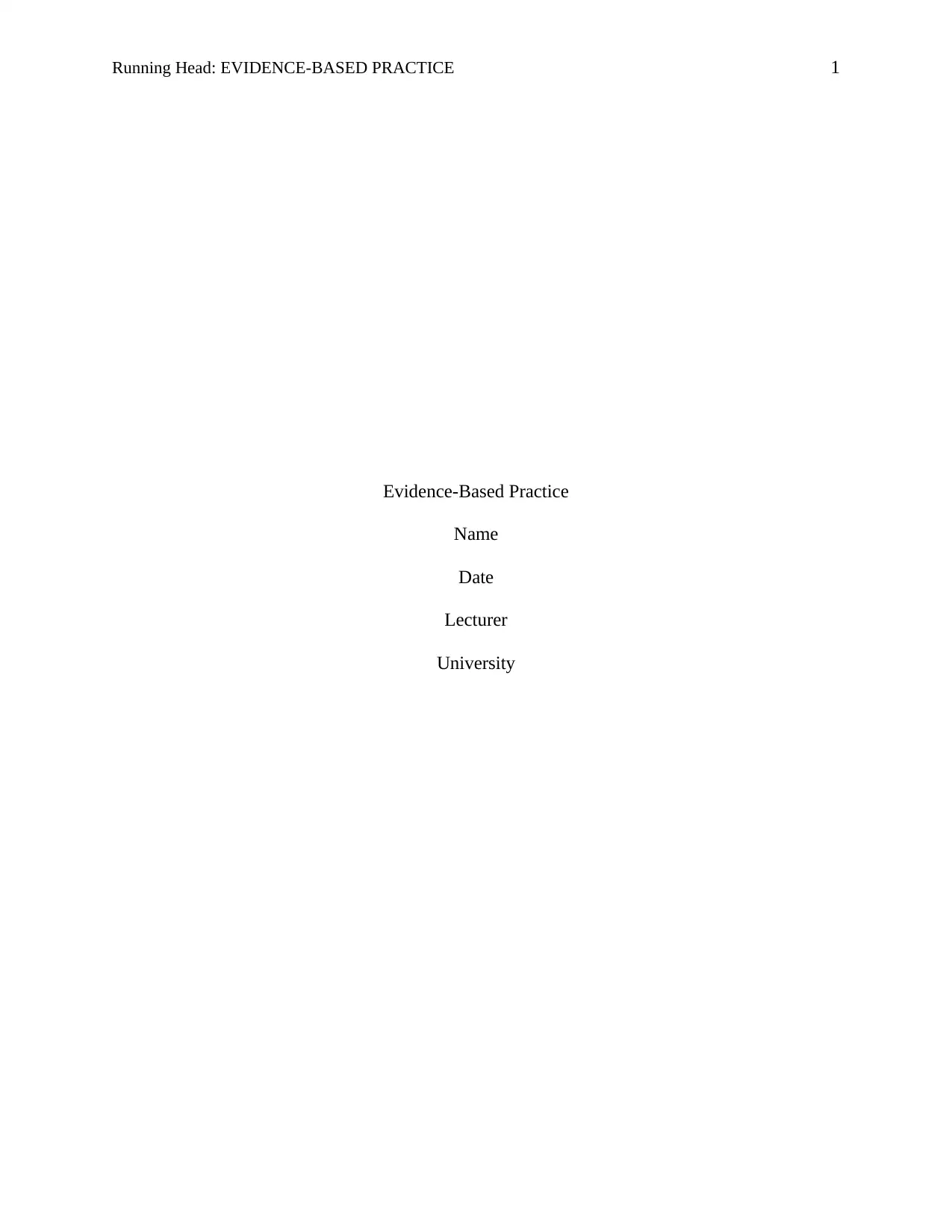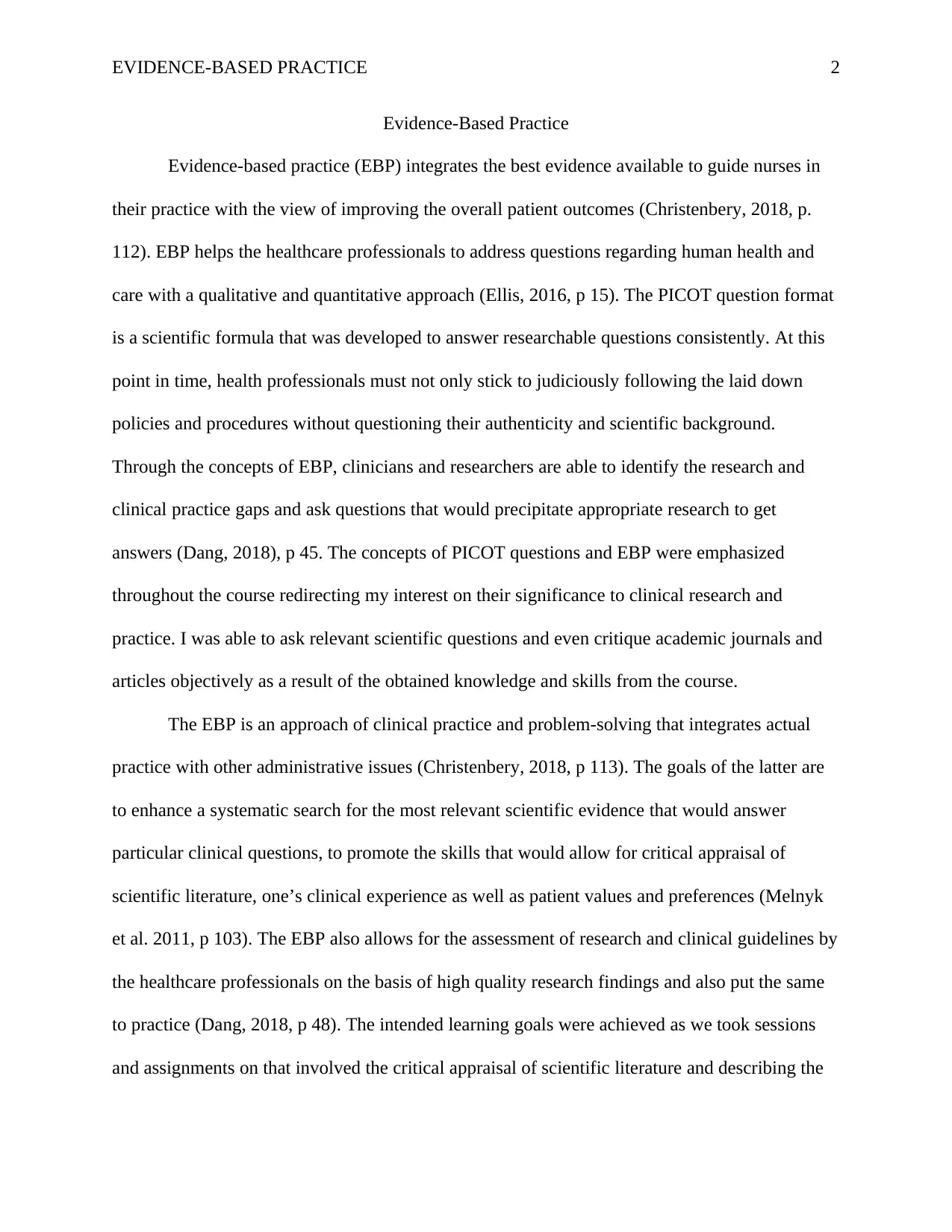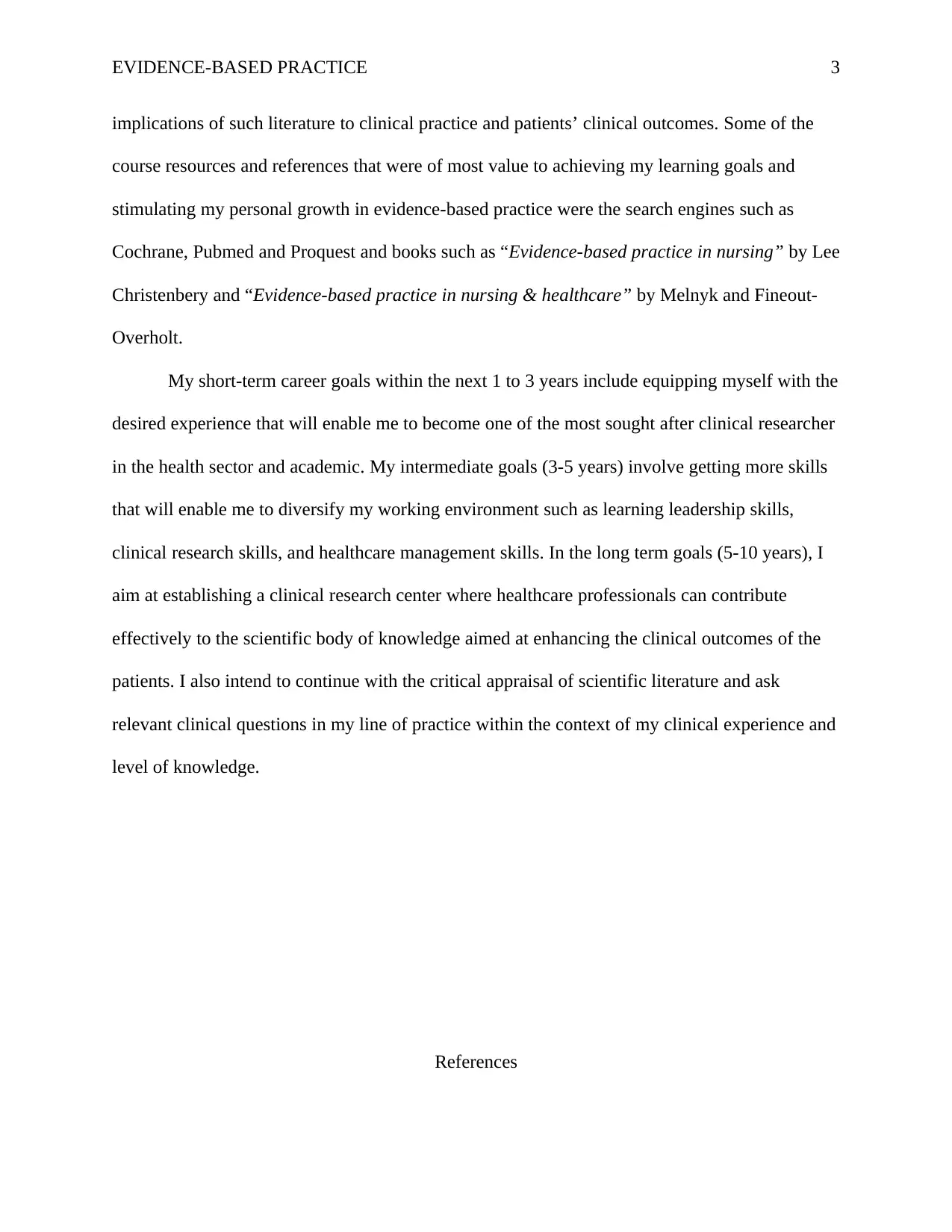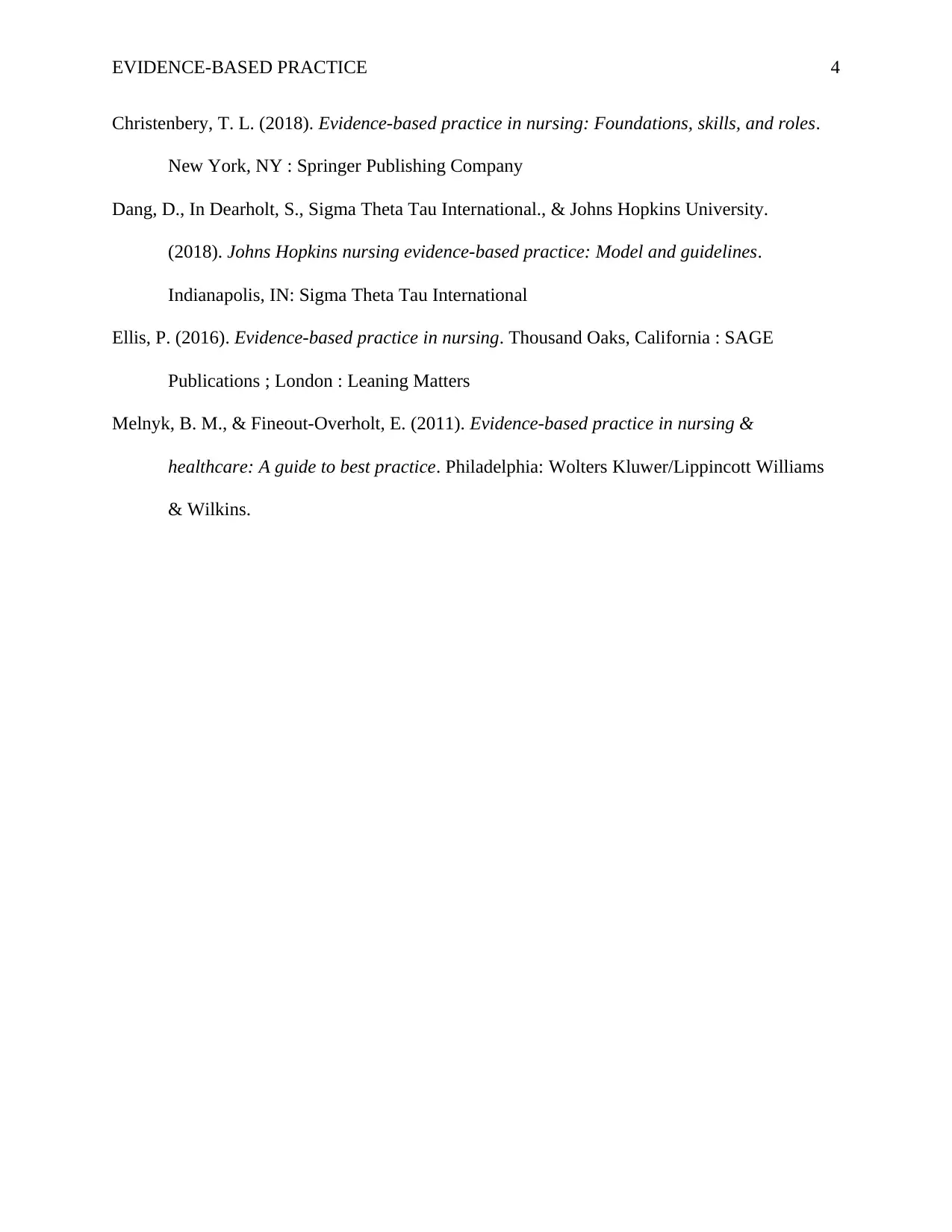Evidence-Based Practice: Application, Learning and Career Goals
VerifiedAdded on 2023/06/05
|4
|727
|462
Essay
AI Summary
This essay discusses the importance of evidence-based practice (EBP) in healthcare, emphasizing its role in improving patient outcomes through the integration of best available evidence. It highlights the use of the PICOT question format for research and clinical practice, and how EBP helps in identifying research gaps and asking relevant scientific questions. The essay also reflects on the learning goals achieved through critical appraisal of scientific literature and describes short-term, intermediate, and long-term career goals, including establishing a clinical research center. Key resources like Cochrane, Pubmed, Proquest, and books by Christenbery and Melnyk et al. are mentioned as valuable tools for personal growth in evidence-based practice.

Running Head: EVIDENCE-BASED PRACTICE 1
Evidence-Based Practice
Name
Date
Lecturer
University
Evidence-Based Practice
Name
Date
Lecturer
University
Paraphrase This Document
Need a fresh take? Get an instant paraphrase of this document with our AI Paraphraser

EVIDENCE-BASED PRACTICE 2
Evidence-Based Practice
Evidence-based practice (EBP) integrates the best evidence available to guide nurses in
their practice with the view of improving the overall patient outcomes (Christenbery, 2018, p.
112). EBP helps the healthcare professionals to address questions regarding human health and
care with a qualitative and quantitative approach (Ellis, 2016, p 15). The PICOT question format
is a scientific formula that was developed to answer researchable questions consistently. At this
point in time, health professionals must not only stick to judiciously following the laid down
policies and procedures without questioning their authenticity and scientific background.
Through the concepts of EBP, clinicians and researchers are able to identify the research and
clinical practice gaps and ask questions that would precipitate appropriate research to get
answers (Dang, 2018), p 45. The concepts of PICOT questions and EBP were emphasized
throughout the course redirecting my interest on their significance to clinical research and
practice. I was able to ask relevant scientific questions and even critique academic journals and
articles objectively as a result of the obtained knowledge and skills from the course.
The EBP is an approach of clinical practice and problem-solving that integrates actual
practice with other administrative issues (Christenbery, 2018, p 113). The goals of the latter are
to enhance a systematic search for the most relevant scientific evidence that would answer
particular clinical questions, to promote the skills that would allow for critical appraisal of
scientific literature, one’s clinical experience as well as patient values and preferences (Melnyk
et al. 2011, p 103). The EBP also allows for the assessment of research and clinical guidelines by
the healthcare professionals on the basis of high quality research findings and also put the same
to practice (Dang, 2018, p 48). The intended learning goals were achieved as we took sessions
and assignments on that involved the critical appraisal of scientific literature and describing the
Evidence-Based Practice
Evidence-based practice (EBP) integrates the best evidence available to guide nurses in
their practice with the view of improving the overall patient outcomes (Christenbery, 2018, p.
112). EBP helps the healthcare professionals to address questions regarding human health and
care with a qualitative and quantitative approach (Ellis, 2016, p 15). The PICOT question format
is a scientific formula that was developed to answer researchable questions consistently. At this
point in time, health professionals must not only stick to judiciously following the laid down
policies and procedures without questioning their authenticity and scientific background.
Through the concepts of EBP, clinicians and researchers are able to identify the research and
clinical practice gaps and ask questions that would precipitate appropriate research to get
answers (Dang, 2018), p 45. The concepts of PICOT questions and EBP were emphasized
throughout the course redirecting my interest on their significance to clinical research and
practice. I was able to ask relevant scientific questions and even critique academic journals and
articles objectively as a result of the obtained knowledge and skills from the course.
The EBP is an approach of clinical practice and problem-solving that integrates actual
practice with other administrative issues (Christenbery, 2018, p 113). The goals of the latter are
to enhance a systematic search for the most relevant scientific evidence that would answer
particular clinical questions, to promote the skills that would allow for critical appraisal of
scientific literature, one’s clinical experience as well as patient values and preferences (Melnyk
et al. 2011, p 103). The EBP also allows for the assessment of research and clinical guidelines by
the healthcare professionals on the basis of high quality research findings and also put the same
to practice (Dang, 2018, p 48). The intended learning goals were achieved as we took sessions
and assignments on that involved the critical appraisal of scientific literature and describing the

EVIDENCE-BASED PRACTICE 3
implications of such literature to clinical practice and patients’ clinical outcomes. Some of the
course resources and references that were of most value to achieving my learning goals and
stimulating my personal growth in evidence-based practice were the search engines such as
Cochrane, Pubmed and Proquest and books such as “Evidence-based practice in nursing” by Lee
Christenbery and “Evidence-based practice in nursing & healthcare” by Melnyk and Fineout-
Overholt.
My short-term career goals within the next 1 to 3 years include equipping myself with the
desired experience that will enable me to become one of the most sought after clinical researcher
in the health sector and academic. My intermediate goals (3-5 years) involve getting more skills
that will enable me to diversify my working environment such as learning leadership skills,
clinical research skills, and healthcare management skills. In the long term goals (5-10 years), I
aim at establishing a clinical research center where healthcare professionals can contribute
effectively to the scientific body of knowledge aimed at enhancing the clinical outcomes of the
patients. I also intend to continue with the critical appraisal of scientific literature and ask
relevant clinical questions in my line of practice within the context of my clinical experience and
level of knowledge.
References
implications of such literature to clinical practice and patients’ clinical outcomes. Some of the
course resources and references that were of most value to achieving my learning goals and
stimulating my personal growth in evidence-based practice were the search engines such as
Cochrane, Pubmed and Proquest and books such as “Evidence-based practice in nursing” by Lee
Christenbery and “Evidence-based practice in nursing & healthcare” by Melnyk and Fineout-
Overholt.
My short-term career goals within the next 1 to 3 years include equipping myself with the
desired experience that will enable me to become one of the most sought after clinical researcher
in the health sector and academic. My intermediate goals (3-5 years) involve getting more skills
that will enable me to diversify my working environment such as learning leadership skills,
clinical research skills, and healthcare management skills. In the long term goals (5-10 years), I
aim at establishing a clinical research center where healthcare professionals can contribute
effectively to the scientific body of knowledge aimed at enhancing the clinical outcomes of the
patients. I also intend to continue with the critical appraisal of scientific literature and ask
relevant clinical questions in my line of practice within the context of my clinical experience and
level of knowledge.
References
⊘ This is a preview!⊘
Do you want full access?
Subscribe today to unlock all pages.

Trusted by 1+ million students worldwide

EVIDENCE-BASED PRACTICE 4
Christenbery, T. L. (2018). Evidence-based practice in nursing: Foundations, skills, and roles.
New York, NY : Springer Publishing Company
Dang, D., In Dearholt, S., Sigma Theta Tau International., & Johns Hopkins University.
(2018). Johns Hopkins nursing evidence-based practice: Model and guidelines.
Indianapolis, IN: Sigma Theta Tau International
Ellis, P. (2016). Evidence-based practice in nursing. Thousand Oaks, California : SAGE
Publications ; London : Leaning Matters
Melnyk, B. M., & Fineout-Overholt, E. (2011). Evidence-based practice in nursing &
healthcare: A guide to best practice. Philadelphia: Wolters Kluwer/Lippincott Williams
& Wilkins.
Christenbery, T. L. (2018). Evidence-based practice in nursing: Foundations, skills, and roles.
New York, NY : Springer Publishing Company
Dang, D., In Dearholt, S., Sigma Theta Tau International., & Johns Hopkins University.
(2018). Johns Hopkins nursing evidence-based practice: Model and guidelines.
Indianapolis, IN: Sigma Theta Tau International
Ellis, P. (2016). Evidence-based practice in nursing. Thousand Oaks, California : SAGE
Publications ; London : Leaning Matters
Melnyk, B. M., & Fineout-Overholt, E. (2011). Evidence-based practice in nursing &
healthcare: A guide to best practice. Philadelphia: Wolters Kluwer/Lippincott Williams
& Wilkins.
1 out of 4
Related Documents
Your All-in-One AI-Powered Toolkit for Academic Success.
+13062052269
info@desklib.com
Available 24*7 on WhatsApp / Email
![[object Object]](/_next/static/media/star-bottom.7253800d.svg)
Unlock your academic potential
Copyright © 2020–2026 A2Z Services. All Rights Reserved. Developed and managed by ZUCOL.



